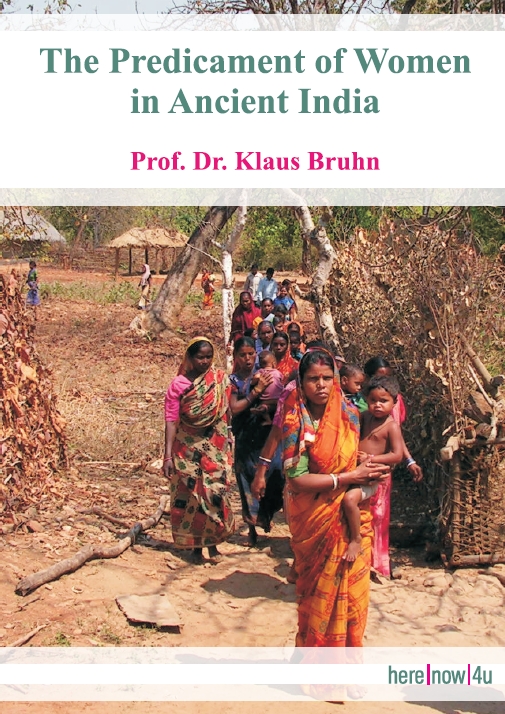The situation to be described in this subsection is in the first place patriarchy pure and simple. This is what we read in Manu's manual:
Manu 5.148. As a child, she must remain under her father's control; as a young woman, under her husband's; and when her husband is dead, under her sons'. She must never seek to live independently.
5.149. She must never want to separate herself from her father, husband, or sons; for by separating herself from them, a woman brings disgrace on both families [natal family and husband's family].
Manu 9.3. Her father guards her in her childhood, her husband guards her in her youth, and her sons guard her in her old age; a woman is not qualified to act independently.
The concept of tutelage is the normal attitude of a patriarchal society. The Sanskrit-root raksh-, 'to protect, guard, take care of, watch, rule', opposed to the noun svatantrata or 'independence', deserves a careful translation (SYED To 161). OLIVELLE uses 'Guarding the Wife' as a title for Manu 9.2-21 (20 verses, not very homogeneous; 9.2ab: "Day and night men should keep their wives from acting independently"); and he uses 'Lack of Independence' for Manu 5.147-150 (5.148d: "she must never seek to live independently"). SYED To mentions the alleged female licentiousness (and the consequent need of protection and control) on pp.160-161. WINTERNITZ likewise mentions the proverbial need of protection: women are not reliable (44-45).
Protection against evil-doers, criminals, culprits is hardly of much importance. Protection is mainly protection against sexual impulses of women and against any authority of the female sex.
A related topic is the internal wickedness of women. We quote the following misogynistic statements:
Manu 9.14. They pay no attention to beauty, they pay no heed to age; whether he is handsome or ugly, they make love to him with the single thought, 'He's a man!'
9.15. Lechery, fickleness of mind, and hard-heartedness are innate in them; even when they are carefully guarded in this world, therefore, they become hostile towards their husbands.
9.17. Bed, seat, ornaments, lust, hatred, dishonesty, malice, and bad conduct -- Manu [here the secondary creator] assigned these to women.
The Mahabharata (13.38) also presents a detailed text on female vices, including the following:
Fire is not contented with fuel, the ocean is not contented with rivers, death is not contented with creatures, women are not contented with men.
S.W.JAMISON gives a long list of misogynistic sayings taken from the Mahabharata. We mention the following (p.13): "Women are speakers of untruth." "Fickleness is the norm in women." "Countries where a woman, a gambler, or a child rules sink helplessly like stone rafts in a river." "Don't put confidence in a woman, or a coward, a lazybones, a violent man, a self-promoter, a thief, an ingrate, much less an atheist." "Women are the root of faults and have weak understanding." "Nothing else more wickeder exists than women." NARASIMHAN quotes from a Vedic text the following: "Women, shudra (the lowest of the four castes), dog and crow embody untruth, sin and darkness." (28-29)
ALTEKAR mentions that "In one Jataka story a woman of 120 is represented as falling in love with a youth of 20." (320). HARA (2004) refers to a hyperbolic verse (Hitopadesha) about the intensity of the sexual urge of women:
The food of women is twofold, her intelligence is fourfold, her determination is sixfold, her sexual urge is eightfold.
All this is a misogynistic strand which possibly originated in Indian asceticism.
Following ALTEKAR we have used the term "perpetual tutelage." ALTEKAR uses it to describe the position of women in India, Europe etc. (India after 400-200 B.C.). The term is not directly taken from Sanskrit but in keeping with the Sanskrit vocabulary. ALTEKAR even calls "perpetual tutelage" a traditional theory (328).
We conclude with a topic introduced by Tryambaka.
Tryambaka asks: "If women are inherently wicked, as they are traditionally supposed to be, then how can they possibly have any interest in learning what Tryambaka is at such pains to teach them? Why does he bother to teach women at all?" (LESLIE 246) Three answers: (a) Before marrying a human the woman has married in turn three gods and received from each a divine gift. Three mystical unions, three forms of purity. See 252-254, §§ 8.4 and 8.6. (b) The sins of women are every month swept away by menstruation. "Menstruation... is the mark of an all-encompassing purity unique to women." 254; see § 8.4. (c) "Even bad people can improve". 260 (260 ff.). The last thesis is supported by a discussion about the difference between a woman's wicked nature (stri-svabhava -- negative) and her ordained function as a good wife (stri-dharma -- positive).
Vocabulary: Women are inherently or by nature (sva-bhava) wicked and unreliable (papa, capala): this is their original sin (stri-svabhava). 'Virtuous behavior of wives' constitutes what is called their stri-dharma. Refer for the alleged corrupt character of women (female sexuality opposed to male yearning for release) inter alia to SYED To 159-160.
 Prof. Dr. Klaus Bruhn
Prof. Dr. Klaus Bruhn
 Title Photo Background:
Title Photo Background: